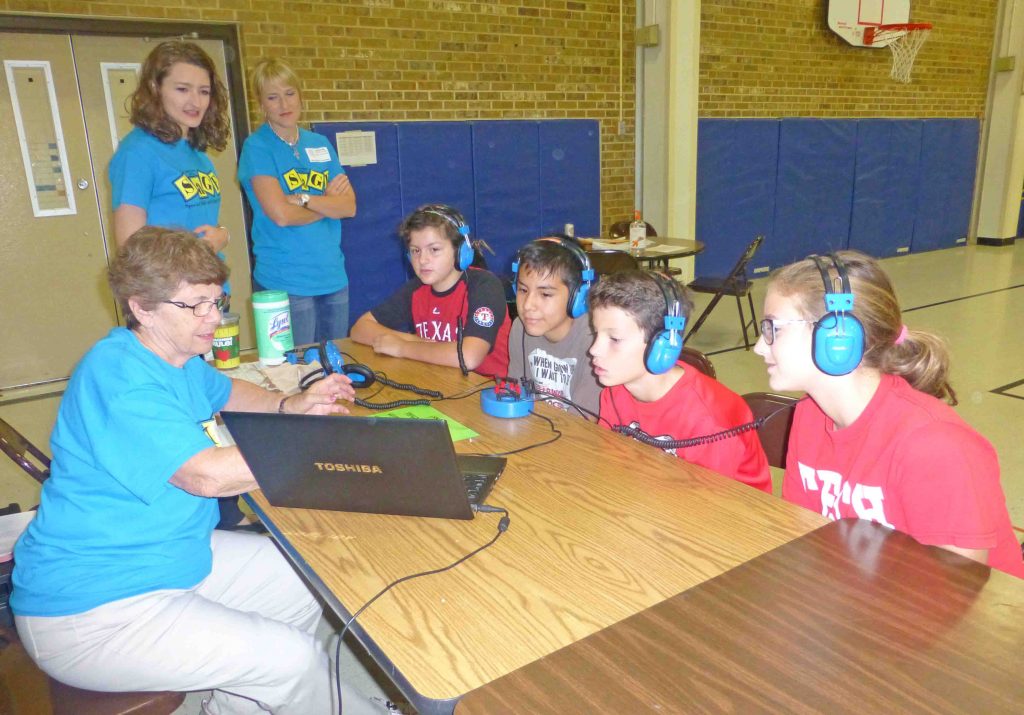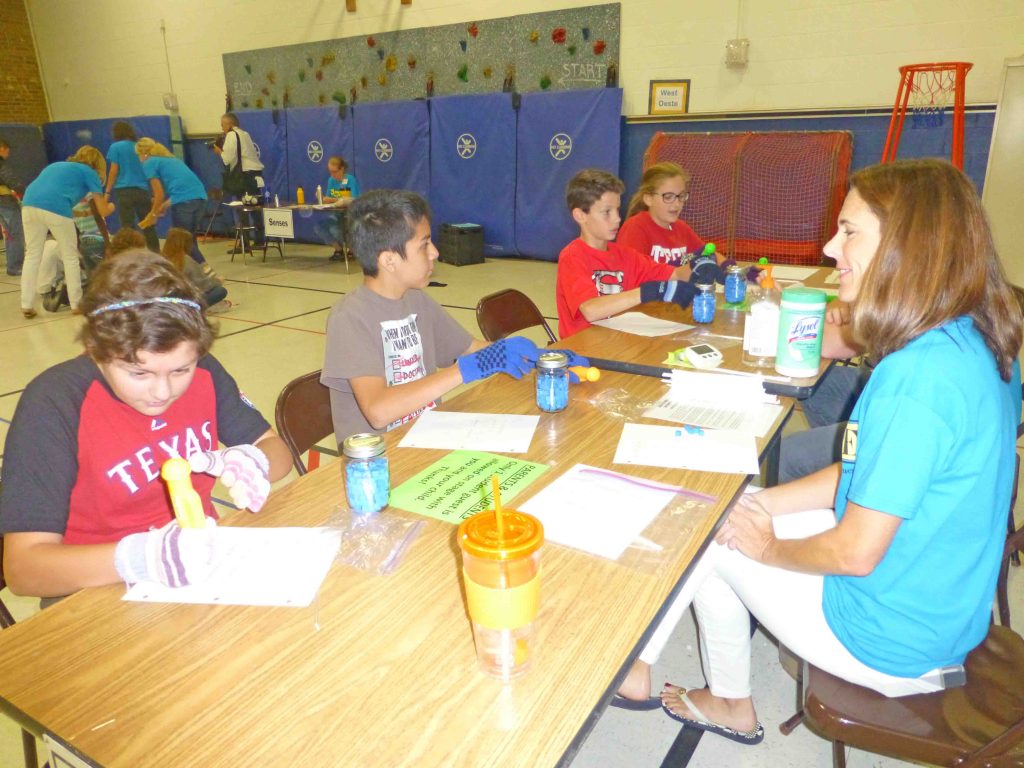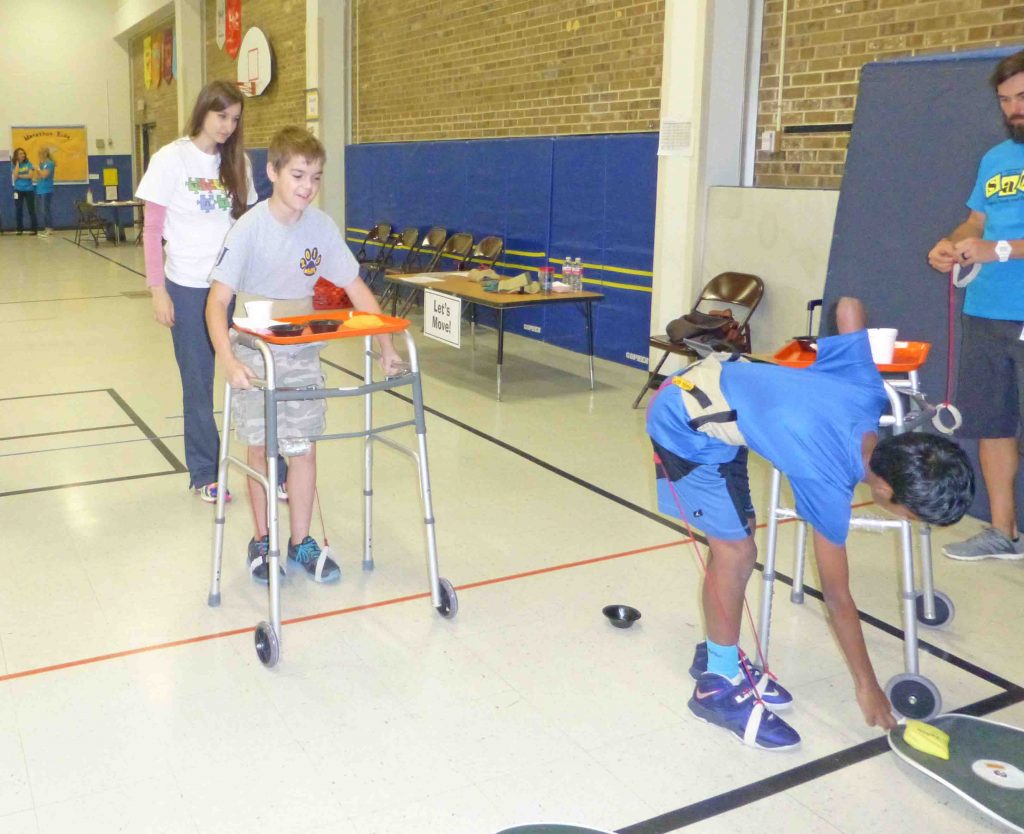Destini Smith, a sixth grader at Merriman Park Elementary, has a seven-year-old cousin with a hearing disability. He doesn’t wear hearing aids, she says, and he often misses out on conversations and family fun. Destini admits she never understood what her cousin experienced – and couldn’t relate to the struggles of classmates with other disabilities – until she participated in a new Richardson ISD program called Understanding Differences. It’s sponsored by the Richardson ISD Council of PTAs.
Students are sent through stations, each designed to simulate the impairments of a learning difference or physical disability. Students at the autism spectrum station play bingo while bells and whistles distract their attention and neck patches act as irritants. They mimic vision impairment with special glasses and hearing impairment with special earphones, while attempting to perform tasks requiring concentration. They try to balance food and drinks on a tray, their bodies loaded down with physical impairments. They stack small items into jars, impeded by gloved fingers which mimic accident or injury.
Alicia Post, Special and Gifted Education (SAGE) Chair for RISD Council of PTAs, says her goal is to hit all RISD elementary schools over the next 5 years.
“The feedback has been amazing, especially from kids,” says Post, mom of a 9-year-old autistic son, “that’s been my favorite part.”
“I was in tears reading the questionnaires they fill out afterward, things like, ‘my grandma is in walker and now I know why it’s so hard for her and I need to help her a little bit more’ or ‘there’s a child in my class I’ve been making fun of who drools, and now I understand why he drools. I won’t do that again.’”
Regan Macnamara, MPE mom and volunteer, says the program makes a big impact on students.
“I think it’s something that kids need to understand,” explains Macnamara. “Naturally when they see kids struggling in different ways, they get embarrassed or they want to back off or they want to make fun. I just think it’s important to walk in somebody else’s shoes. I think kids are naturally good, but I think if they don’t understand something, they want to back off from it.
“Hopefully, after taking part in this, kids will feel more comfortable to reach out to students they go to school with to say, ‘Hey, let me help you with that tray’ or ‘what can you not reach’ or ‘that must feel funny on your skin even though it feels fine to me’ – just to feel for each other.”
Organizers of the event agree.
“I think, just being good citizens of the world, we all have to deal with different people every day,” says Kristin Lee, MPE PTA SAGE Chair. “The great thing about this program, and the reason I’m passionate about it, is it promotes empathy and understanding of special needs for all of our children.
“The kids got a little taste of what it’s like to be some of their classmates who have some of these special learning differences. I was reading some of the feedback forms, and most of our grades have a child or two with autism. The communication and sensory stations really helped them understand what those classmates are going through and really be a little bit more patient.”
MPE’s SAGE population is 25%, but Lee guesses the special ed portion is 15-20%.
“Autism may be easier to see, but dyslexia and processing disorders are way more common than you think,” Lee says.
“Kids are saying I will completely approach this kid differently now because I need to get in front of him and look him in the eye, maybe tap him on the shoulder before I speak to him, whereas before it was easy just to ignore him, especially on the playground.” Others talked about empathy, she says.
The experience was especially helpful to 6th grader Kennedy Kluever.
“My brother, Jackson, has autism,” Kennedy told me,” so I kind of understood already. Plus, he goes to Heroes Camp, and I got to join in that and see what kids with autism experience.”
Kennedy said the program may have helped her friends see Jackson’s life – and Kennedy’s – in a whole new way.
“I’m glad my classmates did it. I think it helped them better understand. They all know I have a sibling with a disability, and they wanted to know what it felt like, too. That way, if there were times I need help, they’ll know what to do.”











